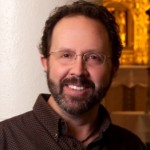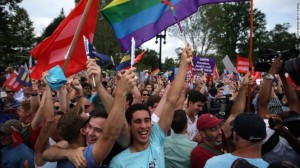The Next Battle Over Gay Rights
By Daniel Burke, CNN Religion Editor
(CNN Sat June 27, 2015) The battle over same-sex marriage may have drawn to a dramatic close Friday at the Supreme Court. But as several justices noted in forceful dissents, the war between religious and LGBT rights is far from over.
In a landmark opinion, a divided Supreme Court ruled that states cannot ban same-sex marriage, establishing a new civil right and handing gay and lesbian advocates a long-sought victory.
President Barack Obama, speaking after the highly anticipated ruling, urged those celebrating to keep in mind that many Americans oppose same-sex marriage “based on sincere and deeply held beliefs.” Those beliefs, he suggested, should remain a protected part of the country’s “deep commitment to religious freedom.”
Still, fierce battles over religious and LGBT rights, like the one fought this spring in Indiana, seem likely to intensify across the country after Obergefell v. Hodges.
While polls show that a majority of religious Americans now support same-sex marriage, many prominent groups — such as the Catholic Church, the Southern Baptist Convention and the Church of Jesus Christ of Latter-day Saints — do not. Leaders from those groups pledged on Friday to seek legal means to shield their beliefs from state interference.
In his sweeping decision, Justice Anthony Kennedy, who wrote for the majority, briefly mentioned faith groups’ right to object to same-sex marriage.
“The First Amendment ensures that religions, those who adhere to religious doctrines and others have protection as they seek to teach the principles that are so fulfilling and so central to their lives and faiths,” Kennedy said.
The point bears repeating, the justice said.
“It must be emphasized that religions, and those who adhere to religious doctrines, may continue to advocate with utmost, sincere conviction that, by divine precepts, same-sex marriage should not be condoned.”
But more conservative justices and a number of religious groups chided Kennedy for failing to mention the First Amendment’s “free exercise” clause.
Religious rights (and rites) aren’t limited to preaching and teaching, they argued. They also entail individuals’ and organizations’ “free exercise” of faith, a wide swath of activities that run from sacred ceremonies to performing charitable works and running businesses according to religious principles.
“Religious liberty is about freedom of action in matters of religion generally,” Justice Clarence Thomas said in his dissent, “and the scope of that liberty is directly correlated to the civil restraints placed upon religious practice.”
He dismissed the majority’s nod toward religious liberty as a “weak gesture,” arguing that the ruling could have “ruinous consequences.”
“In our society, marriage is not simply a governmental institution; it is a religious institution as well,” Thomas said. “Today’s decision might change the former, but it cannot change the latter.”
Friday’s decision makes it “all but inevitable,” the conservative justice said, that competing definitions of marriage will come into conflict. Thomas suggested that pastors and churches will be confronted with demands to participate in and endorse same-sex marriages.
There is historical precedent for such demands, Thomas said, citing Virginia laws that once imposed criminal penalties on pastors who presided over mixed-race marriages.
Chief Justice John Roberts said “hard questions” will arise when people of faith exercise their religious liberty in ways that conflict with the new right to same-sex marriage.
What happens, the chief justice asked, when a religious college provides student housing only to heterosexual couples? Or a faith-based adoption agency refuses to place children with same-sex spouses? Would both lose their tax exemptions?
“There is little doubt that these and similar questions will soon be before this Court,” Roberts continued. “Unfortunately, people of faith can take no comfort in the treatment they receive from the majority today.”
Justice Antonin Scalia, in his signature scathing style, took the argument even further, accusing his colleagues of playing God.
The conservative justice said that Friday’s ruling on same-sex marriage “is not of special importance to me.”
“It is of overwhelming importance, however, who it is that rules me,” Scalia said. “Today’s decree says that my Ruler, and the Ruler of 320 million Americans coast-to-coast, is a majority of the nine lawyers on the Supreme Court.”
Archbishop William Lori of Baltimore, the U.S. Catholic bishops’ point-man on religious rights, said Friday’s ruling will affect “thousands” of state and local statutes across the country. The archbishop said he could foresee “a lot of legal controversies in terms of the way we organize and run our ministries.”
Most troubling for the Catholic Church, Lori said in a conference call with the media, is that while ruling recognizes religious groups’ right to free speech, it doesn’t acknowledge “the right to follow our teachings when we are intersecting with the broader society.”
Evangelicals, too, who make up about 25% of the country’s population, pledged to fight the legal implications of Friday’s ruling.
“In the coming years, evangelical institutions could be pressed to sacrifice their sacred beliefs about marriage and sexuality in order to accommodate whatever demands the culture and law require,” dozens of prominent evangelicals said in a joint statement.
“We will not allow the government to coerce or infringe upon the rights of institutions to live by the sacred belief that only men and women can enter into marriage.”
One of the statement’s signees, Russell Moore, president of the Southern Baptist Convention’s Ethics & Religious Liberty Commission, called “religious liberty” the “next front in the skirmish in American life.”
The skirmish will likely endure for years, Moore said at a press conference on Friday, with casualties on both sides.
“One of the most tragic results we could possibly see is an unrelenting cultural war from progressives toward those who dissent because of deeply held religious convictions.”
CNN’s Eugene Scott contributed to this report.
 Dan Burke joined CNN Digital in 2013. He is a husband, father, author, and Executive Director of the EWTN’s National Catholic Register. He has held executive positions with multiple for-profit and not-for- profit corporations including Circle Media Inc., the parent company of Circle Press, the National Catholic Register (prior to the EWTN acquisition), Catholic.net, and Faith & Family magazine.
Dan Burke joined CNN Digital in 2013. He is a husband, father, author, and Executive Director of the EWTN’s National Catholic Register. He has held executive positions with multiple for-profit and not-for- profit corporations including Circle Media Inc., the parent company of Circle Press, the National Catholic Register (prior to the EWTN acquisition), Catholic.net, and Faith & Family magazine.
Dan has been published on the topics of teamwork, communication, corporate strategy, and technology and has a book coming out next year on the topic of spiritual direction and the interior life. His spiritual journey began in Judaism, matured into a living relationship with Christ in Evangelical Christianity, and after fifteen years of exploration has found his home in the Catholic Church. Dan has served in an advisory capacity to Fellowship of Catholic University Students, and founded the most widely read blog dedicated to faithful Catholic spirituality “Catholic Spiritual Direction” (www.RCSpiritualDirection.com). His passion is serving others to deepen their relationship with Christ and His glorious Church.

